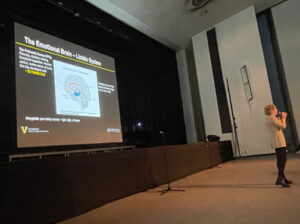
Photo by Mary O’KEEFE
By Mary O’KEEFE
A Crescenta Valley High School Falcon alumna (1983) returned to the high school to share her story, and findings, in a student assembly titled, “The Impact of Stress and Substance Use on the Developing Brain.”
Kristen Gilliland earned her Ph. D. in organic chemistry and served as an associate professor of Chemistry at Cal Poly State University. She taught organic chemistry, neurochemistry and the chemistry of drugs and poisons. In 2018 she researched new treatments for schizophrenia at the Warren Center for Neuroscience Drug Discovery in Tennessee. Also in 2018 she delivered a TEDx presentation titled, “Rewiring Revolution: Neuroplasticity’s Impact on Wellbeing.” She presently is director of outreach and advocacy programs with the Warren Center and professor emerita, California Polytechnic State University, San Luis Obispo.
Her presentation to the CVHS students, which she makes for countless other schools and organizations, did not just deal with science; she also shared the personal journey her son had taken with drugs and mental illness that ultimately led to his death in 2019 due to an accidental overdose.
“I sat here and I have to say it hasn’t changed much; it’s very cool to walk around the school,” Gilliland said of her return to her hometown school.
She graduated in 1983. Her dad taught and coached at CVHS beginning in 1962 and even after retiring continued to help around the campus until 2010.
“What I am going to talk to you about today is the impact of stress and substance use on the developing brain,” she told the audience of students.
She started by sharing her story of how, when she attended CVHS, she knew she wanted to go to college because she loved to learn, and how she eventually ended up as a faculty member at Cal Poly, San Luis Obispo.
“I have twin boys and in about 2014 one of my boys, who was 17 or so [at the time], started experimenting with weed, with marijuana,” she said.
At the time the personal use of marijuana was not legalized but it was legal to use it for medical reasons.
“He started using and about two [or three] years later he started hearing voices and he started to see things that weren’t there,” she said.
She took him to a psychiatrist and he was diagnosed with schizophrenia.
“The doctor said [the schizophrenia] might be cannabis-related,” Gilliland said. “We are just starting to see the effect of cannabis on the developing brain.”
She described the adolescent brain from about 10 years old to the early 20s. She explained what happened when her son would take the medications, or antipsychotics, the doctors gave him for schizophrenia to quiet the delusions and hallucinations. But then he stopped using them.
She described him as a creative artist and a smart person but as his abuse and mental health issues continued he “just didn’t want to do anything anymore.”
He started using other substances he thought would help him.
“He began to dabble with Xanax, and then went into cocaine and eventually fell into heroin and became addicted to heroin,” she said. “As a mom you try, you try, you try [to find a way to help].”
She asked if anyone in the audience knew someone who suffered from a substance use disorder or addiction; several students nodded their heads.
“It’s not them anymore,” she said. “They’re gone.”
And so she started researching why this would happen, what happens to the brain when a young person goes through disorder or addiction. She went back to the lab and started to conduct research.
“It was the only thing I could do because he didn’t want to get help,” she said. “That is very common for people who are suffering from addiction.”
As she researched and though her son was getting help he got deeper and deeper into his heroin and cocaine addictions.
“And then on March 6, 2019, I lost my baby boy,” she said, and then to the audience: “He was just like you … so smart, wholeheartedly friendly, creative, intelligent and beautiful. He just made some bad decisions.”
After her loss she went back to research and worked on discovering how the adolescent brain develops.
“I knew I was going to do something, I knew I had to do something in his name,” she said, “because no child deserves to go through what he went through, not one of you.”
Next week, CVW will continue with what Dr. Gilliland’s found through her research.
